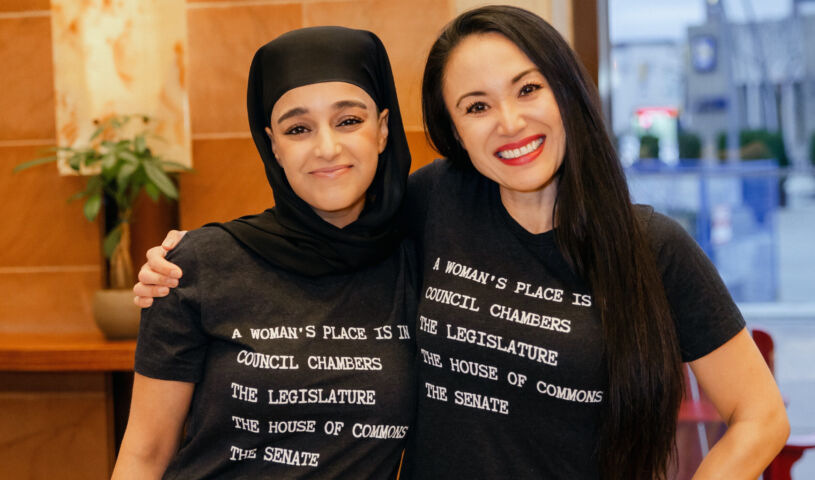Brampton councillors call for end to harassment, intimidation of women
 City of Brampton regional councillors Rowena Santos (right) and Navjit Kaur Brar (left) spoke out recently to call for an end to the harassment and intimidation of women in leadership positions. Photo: Shannon Tobin-Haughey
City of Brampton regional councillors Rowena Santos (right) and Navjit Kaur Brar (left) spoke out recently to call for an end to the harassment and intimidation of women in leadership positions. Photo: Shannon Tobin-Haughey
“It’s too hard! It’s too contradictory and nobody gives you a medal or says thank you! And it turns out in fact that not only are you doing everything wrong, but also everything is your fault.”
That bit of dialogue is from America Ferrera’s iconic monologue from the 2023 movie, “Barbie.” But it was also shared recently by City of Brampton Regional Coun. Rowena Santos during an address to her colleagues ahead of International Women’s Day. Santos’ comments came as she urged an end to the epidemic of harassment and intimidation women are facing.
“The emotional and mental toll of dealing with the sexism, misogyny, prying, unwarranted attacks, harassment, hostile accusations, misinformation, judgement, rumours, lies, and more,” Santos said in her Feb. 28 address to council. “For women like us, elected women in particular, it’s getting worse. And as more women get elected, as we stand out with our ideas, action, and voice, the more hostile it gets.”
Standing Up to Harassment
During her comments, Santos – who was joined in speaking out by her colleague, Regional Coun. Navjit Kaur Brar – spoke about how women often must work much harder than their male counterparts. At the same time, they must balance their family needs while protecting themselves from sexism, misogyny, and harassment. Santos’ comments also come not long after France Bélisle, the first female mayor of Gatineau, resigned due to the hostile environment.
Bélisle’s situation, Santos said, is not unique, as many women face similar challenges. These levels of escalating harassment have become an epidemic that’s threatening democracy and is one reason why she felt the need to speak out.
But the other reason is reflected in some of recent personal experiences. A brief snippet of those examples is troubling to say the least:
- attending events surrounded mostly by men and getting social media comments suggesting that she’s sleeping with the person next to her in the photo
- being followed and harassed to her car with personal attacks, lies, and misinformation
- in a handwritten letter, delivered to her office, an individual concludes their attack by writing, “You are a piece of garbage who deserves to be RAPED AND KILLED (in all capital letters)”
With all that on her mind, Santos said she needed to speak out.
“It’s just gotten to a point where I can’t keep this a secret anymore. It needs to be called out,” Santos said. “I know that there are other women across the whole country, across the whole world, who go through this in leadership positions. And for my own sake, for my own mental health, I really needed to let go of some of that baggage.”
What’s Right is Right
As Santos herself alluded to, she is far from the only women having to deal with these escalating levels of harassment.
For Brar, joining with Santos was “a very emotional day,” but one that represented two years of facing her own share of discrimination and harassment. In her comments to council, Brar said she has walked into public events and felt “overlooked, singled out, and even excluded.” She has been to public events that she has been specifically invited to and felt like “the odd person out” as she had to go out of her way to even be acknowledged.
And like many other women in leadership roles, she has had to face criticism around what she wears, how she looks, and how she presents herself alongside male colleagues. But while her experiences have been difficult, Bar said she was eager to stand alongside Santos in speaking up.
“Women don’t speak out. When you want to speak out, you have this mindset where you’re thinking, ‘Is it right to do that? Is it okay as a woman? Would it be a negative thing in the community, or would it be positive?’” Brar said. “As human beings, I shouldn’t even have been thinking about that. What is right is right. What is wrong is wrong.”
In the early days (years) of her council career, Brar said she would often speak with her husband when instances of harassment would arise. “He always has my back,” Brar said. Even so, she recalls that she “cried a lot” in her first couple months on council but would reach out to Santos for advice, who told her it was something that is all too common.
It wasn’t completely unexpected. After all, Brar said she was warned about what could happen if she entered the political realm as a woman and a woman of colour. She would speak to other women in leadership roles, community members, role models, even MPs and MPPs, and they all shared similarly negative stories.
Women Facing Escalating Threats
Kate Graham has seen first-hand how the vitriol has picked up in recent years. Graham, an author, podcaster, consultant, and professor, worked in the municipal space for over a decade and has also run for public office on several occasions.
Graham said when discussing the escalation of harassment one needs to start with looking at the bigger picture.
There is a problem in Canada, Graham said, where no order of government has fully represented the population that it serves. So, for people who break the mold in some way – women, women of color, people who experience other barriers – when they get into these positions, their experience over time consistently has been worse.
They’ve been subject to higher levels of scrutiny and criticism. And sometimes, she added, disturbing levels of violent rhetoric and threats. Ironically, it is made all the more common given the nature of local government.
Local elected officials are closer to their citizens, Graham said. And so, when the population is struggling, the ease of access to their local councillor or mayor creates a problematic situation. That doesn’t even factor in the increasingly negative social media space, disruptions caused by the lingering effects of the pandemic, the rising cost of housing, and a general declining trust in government and public officials.
This all comes tighter to create a perfect storm that Graham said is making it difficult for people to serve today.
“There is ample data to suggest that female candidates, diverse candidates, are subject to a greater level of horrible things being said online. That’s certainly getting worse,” Graham said. “Some things are getting worse, but there’s also reason to have hope that in having conversation about this and people openly sharing their experiences, there’s hope for the beginning of a greater level of awareness and putting our foot down and saying enough is enough.”
Allies Must Stand Up, Speak Out
Everyone, all genders, whether they’re in politics or not, all have a voice, Graham said. That voice can be used to call out something that isn’t okay. As such, she said it is brave that so many elected officials are sharing their experiences.
Graham added that the importance of that voice isn’t just for women in the municipal space, but their male colleagues and allies as well.
In Brampton, both Santos and Brar have lauded the efforts of Mayor Patrick Brown in supporting women in finding their space in the political realm.
For his part, Brown said he always wants to be “an ally and supporter,” especially in light of the vitriol that women often face. When it comes to Santos in particular, Brown said he knows “her heart is in the right place” and that she is simply trying to help move the city forward.
Unfortunately, Brown said there is often a double standard that exists as he doesn’t see the same level of hate targeting other male colleagues. It is with that in mind – and perhaps being the father of a daughter himself – that Brown said he was proud of the call for change that Santos was making when she took the floor.
Brown called Santos’ words “incredibly courageous, articulate, and eloquent.” He also said the type of vitriol women are facing shouldn’t be swept under the carpet.
In fact, Brown said that the type of harassment and threats women receive needs to be called out. But it can’t just be the targets of such venom making the call, but the colleagues who stand beside them as well.
“That’s our responsibility as allies – that when we see it we have to call it out. You can’t ignore it,” Brown said. “This ugly side exists in our country because we don’t call it out. And so I think her message is very compelling and that was my immediate reaction is that we do have to name it and call it out and expose it when it occurs.”
Take a Stand Against Hate
Brown’s sentiment is echoed by Santos, who said she feels supported by so many allies around her.
Santos said that silence never helps. This is why she calls on allies to acknowledge their privilege and recognize that while they sit at a table with women, some voices are struggling more to be heard.
When reflecting upon the reaction she and Brar received at Brampton council, Santos admits she wasn’t anticipating getting a standing ovation. But it is, she added, what is needed.
“We need that level of support, not just when somebody gives a big speech, that sounds good, but during those times when it’s really difficult and we’re questioning why we’re even here,” Santos said. “When they don’t even know the ‘Barbie’ monologue. That’s the time when we need people to stand up for us.” MW
✯ Municipal World Executive and Essentials Plus Members: You might also be interested in Meyer’s article: Rowena Santos: Take your place and own it with style and grace.
Sean Meyer is digital content editor for Municipal World.
Related resource materials:



